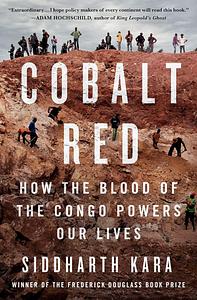Take a photo of a barcode or cover
challenging
dark
emotional
informative
reflective
sad
slow-paced
dark
emotional
informative
reflective
sad
slow-paced
adventurous
challenging
dark
emotional
informative
mysterious
reflective
sad
tense
slow-paced
challenging
dark
emotional
informative
reflective
sad
medium-paced
Graphic: Child abuse, Child death, Slavery
dark
emotional
informative
sad
medium-paced
Eye opening, heartbreaking, confounding
Really powerfully written- excellent journalism on a subject that I didn’t know much about until now
informative
reflective
sad
tense
medium-paced
"What did the child die for, for one sack of cobalt? Is that what a Congolese children are worth?"
This book lays out the suffering that occurs as a result of the cobalt industry. I wanted to read this book because I had been learning little about the cobalt crisis through the free Congo movement. Before reading this book I had a simplistic understanding of the issue, and thought the west was less wasteful, it could help the issue. After learning a basic understanding, I realize the legacy of colonialism, corporate greed, and a corrupt government are the root of the issue. It struck me when Kara said "Reports from the area describe torture, murder, chopping off hands and feet, techniques passed down the generations from Leopoldo's terror squad." It showed how corporation exploitation overseas is the new way nations colonize.
I learned from this book and liked how he included personal stories from the miners in each chapter. The chapter where he provided a chronological order of the history of the Congo was impactful. I wasn't a fan of how the book was written at times, and while would have preferred him to condense, the information is important. Prime minister Lumumba's letter at the end was a great choice to end the novel. It provided a glimmer of hope that one day Congo will be free and tell their own story. I hope in my lifetime there is a free Congo!!
This book lays out the suffering that occurs as a result of the cobalt industry. I wanted to read this book because I had been learning little about the cobalt crisis through the free Congo movement. Before reading this book I had a simplistic understanding of the issue, and thought the west was less wasteful, it could help the issue. After learning a basic understanding, I realize the legacy of colonialism, corporate greed, and a corrupt government are the root of the issue. It struck me when Kara said "Reports from the area describe torture, murder, chopping off hands and feet, techniques passed down the generations from Leopoldo's terror squad." It showed how corporation exploitation overseas is the new way nations colonize.
I learned from this book and liked how he included personal stories from the miners in each chapter. The chapter where he provided a chronological order of the history of the Congo was impactful. I wasn't a fan of how the book was written at times, and while would have preferred him to condense, the information is important. Prime minister Lumumba's letter at the end was a great choice to end the novel. It provided a glimmer of hope that one day Congo will be free and tell their own story. I hope in my lifetime there is a free Congo!!
"we are rarely arsed, if ever, to confront the untold suffering that has been endured by Africa"
This book was such an heartbreaking look at what white supremacy and capitalism have done to the Africa. It really make you stop and really take in how almost every aspect of our lives is touched by the suffering of Africans.
This book was such an heartbreaking look at what white supremacy and capitalism have done to the Africa. It really make you stop and really take in how almost every aspect of our lives is touched by the suffering of Africans.
challenging
dark
emotional
informative
medium-paced




